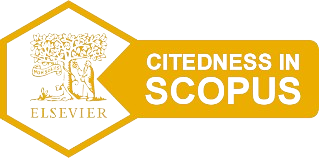Life and Career Skills in Mathematics Learning for High School Students in Indonesia: The Perspectives of Teachers and Students
DOI:
https://doi.org/10.15408/tjems.v9i2.25660Keywords:
life and career skills, mathematics learning, structural equation modeling keterampilan hidup dan karir, pembelajaran matematika, structural equation modelingAbstract
Abstract
Students need to possess the right life and career skills to face future challenges. Therefore, this study aims to determine the effect of mathematics teachers' life skills on high school students in Indonesia. Data were collected from 190 mathematics teachers and 627 high school students through questionnaires consisting of 15 and 45 statements, respectively. The data collected were analyzed using the Structural Equation Modeling (SEM) method and the Smart-PLS v.3.2.9 software. The results showed that both mathematics teachers (77.50%) and high school students (83%) had a good understanding of life and career skills. However, their life skills were rated low due to teachers' difficulty in translating life and career skills into planning and implementing mathematics learning. This means that the methods used by teachers do not explore students' potential. Furthermore, the correlation between indicators of student life skills was found to be in the medium and large categories, indicating a significant relationship between the indicators of student life skills.
Abstrak
Para Siswa perlu memiliki keterampilan hidup dan karier yang tepat untuk menghadapi tantangan masa depan. Oleh karena itu, penelitian ini bertujuan untuk menentukan pengaruh keterampilan hidup guru matematika terhadap siswa SMA di Indonesia. Data dikumpulkan dari 190 guru matematika dan 627 siswa SMA melalui kuesioner yang terdiri dari 15 dan 45 pernyataan, masing-masing. Data yang terkumpul dianalisis menggunakan metode Structural Equation Modeling (SEM) dan perangkat lunak Smart-PLS v.3.2.9. Hasil penelitian menunjukkan bahwa baik guru matematika (77,50%) maupun siswa SMA (83%) memiliki pemahaman yang baik tentang keterampilan hidup dan karier. Namun, keterampilan hidup mereka dinilai rendah karena kesulitan guru dalam menerjemahkan keterampilan hidup dan karier ke dalam perencanaan dan pelaksanaan pembelajaran matematika. Ini berarti metode yang digunakan oleh guru tidak mengeksplorasi potensi siswa. Selain itu, korelasi antara indikator keterampilan hidup siswa ditemukan berada dalam kategori sedang dan besar, menunjukkan hubungan yang signifikan antara indikator keterampilan hidup siswa.
How to Cite : Miftah, R., Kurniawati, L., Herman,T., Juandi, D., Maulida, A. S. (2022). Life and Career Skills in Mathematics Learning for High School Students in Indonesia: The Perspectives of Teachers and Students. TARBIYA: Journal of Education in Muslim Society, 9(2), 135-148. doi:10.15408/tjems.v9i2.25660.
References
Anwar. (2015). Pendidikan Kecakapan Hidup. Alfabeta, Bandung, 2015, p. 54.
Arsad, N. Osman, K. & Soh, T. (2011). Instrumen Development Century Skills In Biology. Procedia Social and Behavioral Sciences 15: 1470 – 1447.
Barak, M., & Levenberg, A. (2016). Flexible thinking in learning: An individual differences measure for learning in technology-enhanced environments. Computers & Education, 99, 39–52
Chin, W. W. (1998). The Partial Least Squares Aproach to Structural Equation Modeling. Modern Methods for Business Research, 295, 336
Depdiknas. (2002). Pendidikan Berorientasi Kecakapan Hidup (Life Skill) Melalui Pendekatan Broad-Based Education, Departemen Pendidikan Nasional, Jakarta, 2002, p. 8.
Fiedler. F. E. and Charmer. M. M. (1974). Leadership and Effective Management. Glenview Illinois: Scott, Foresman, and Company. p. 55
Ghozali, Imam. (2008). Structural Equation Modelling. Edisi II, Universitas Diponegoro, Semarang
Ghozali, I. (2012). Aplikasi Analisis Multivatiate dengan Program IBM SPSS. Semarang: Badan Penerbit Universitas Diponegoro
Hair, J. F., Anderson, R. E., Tatham, R. L. & Black, W. C. (2003). Multivariate Data Analysis (5th Ed.), Pearson Education, India.
Handayani, S. (2009). Muatan Life Skills Dalam Pembelajaran Di Sekolah: Upaya Menciptakan Sumber Daya Manusia Yang Bermutu. Prosiding Konferensi Internasional Pendidikan, UPI – UPSI, Malaysia
Henseler, Jorg, Ringle, Christian M. and Sarstedt. M, Marco. (2015). A New Criterion For Assessing Discriminant Validity In Variance-Based Structural Equation Modeling. J. of the Acad. Mark. Sci.
Kemendikbud. (2017). Inilah Perbedaan Revisi K13 Tahun 2017 dengan RPP K-13 Revisi 2016. Tersedia online: http://www.infokemendikbud.com/2017/07/penting-inilah-perbedaan-revisi-k13.html
Knowles. (2007). Self-Directed Learning: A Key Component Of Aduld Learning Theory. Jurnal Business and Public Administration Studies. Vol. 2 No. 2
Kustiandi, Megasari Rizky dan Putri. (2017). Pendekatan Life Skill Berbasis Lesson Study pada Mata Kuliah Statistik Inferensial. Jurnal Pendidikan Ekonomi, Vol.10, No.1.
Muhaimin. (2003). Arah Baru Pengembangan Pendidikan Islam. Nuansa, Bandung, p. 155.
Ongardwich, N., Kanjanawasee, S., & Tuipae, C. (2015). Deve-lopment of 21st century skill scales as perceived by students. Procedia-Social and Behavioral Sciences: 737 – 741
Richardo, R. (2016). Program Guru Pembelajar: Upaya Peningkatan Profesionalisme Guru di Abad 21. Prosiding Seminar Matematika dan Pendidikan Matematika. ISBN: 978-602-6122-20-9 hal 777-785 November 2016
Schafersman S. D. (1991). An introduction to critical thinking. URL (last checked 28 March 2011). http://www.freeinquiry.com/critical-thinking.html
Sekaran, U. (2017). Metode Penelitian untuk Bisnis. Jakarta: Salemba Empat.
Slamet, P.H. (2001). Pendidikan Kecakapan Hidup: Konsep Dasar dalam Jurnal Pendidikan & Kebudayaan. Jakarta: Kementerian Pendidikan dan Kebudayaan Republik Indonesia.
Trilling, Bernie, and Fadel, Charles. (2009). 21st Century Skills: Learning for Life in Our Times, John Wiley & Sons, 978-0-47-055362-6.
Wahyudin, Rusman & Rahmawati. (2017). Penguatan life skills dalam implementasi kurikulum 2013 pada SMA di Jawa Barat. Mimbar Pendidikan: Jurnal Indonesia untuk Kajian Pendidikan
Word Health Organization. (1997). Life Skills Education for Children and Adolescents in Schools: Introduction and Guidelines to Facilitate the Development and Implementation of Life Skills Programs. Program on Mental Health, World Health Organization, Geneva, WHO/MNH/PSF/93. 7A. Rev. 2. pp. 1-49.











